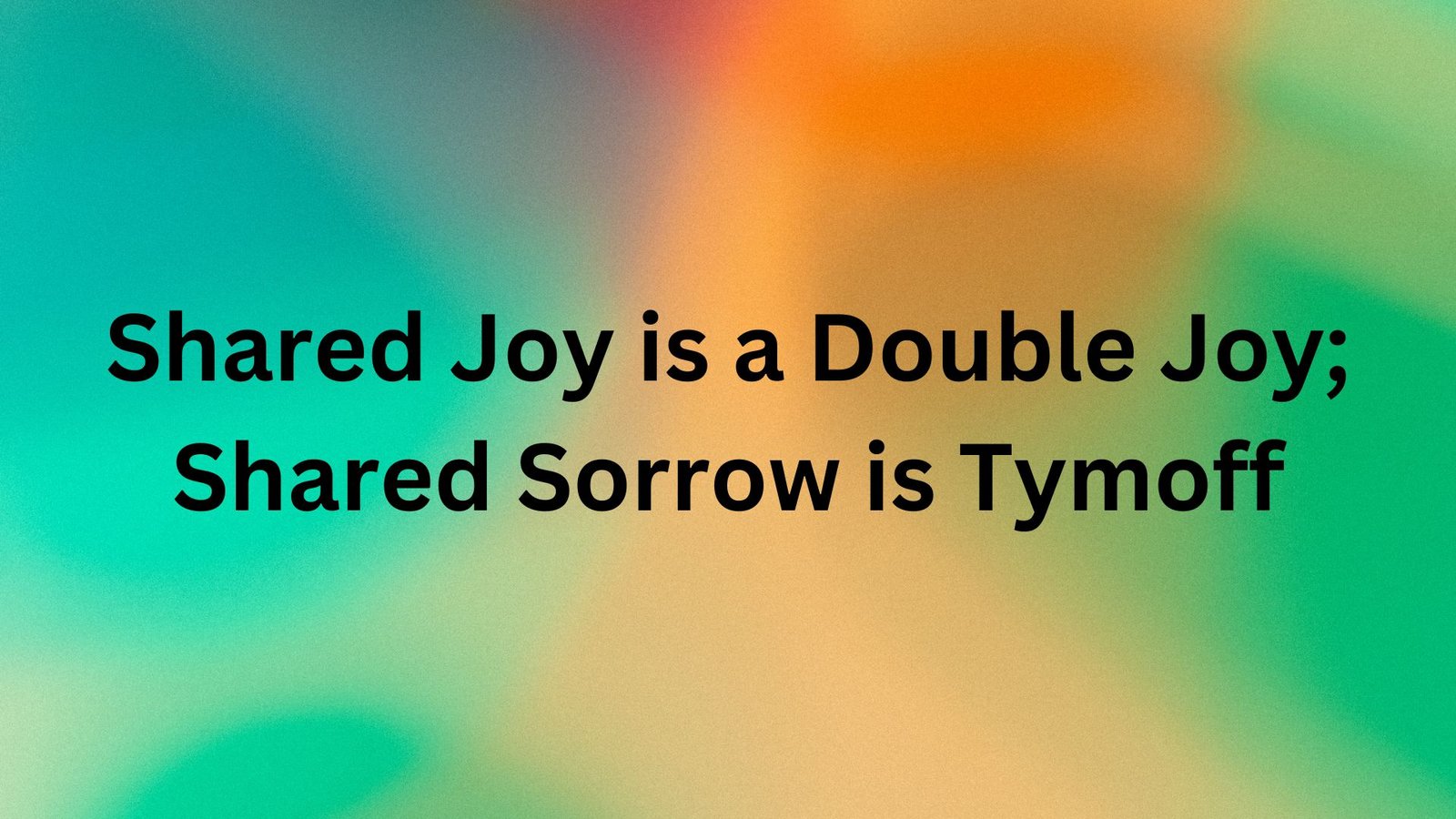
Shared Joy is a Double Joy; Shared Sorrow is Tymoff
Have you ever heard the saying, “Shared joy is a double joy; shared sorrow is tymoff“? In this blog post, we will explore the power of sharing both our joys and sorrows with others. From celebrating life’s happy moments to finding comfort in times of sadness, we’ll dive into how connecting with others can amplify our emotions and bring us closer together. So grab a cup of tea and get ready to explore the beauty of shared experiences!
Introduction to the Concept of “Shared Joy is a Double Joy; Shared Sorrow is Tymoff”
The saying “shared joy is a double joy; shared sorrow is half a sorrow” has been around for centuries and holds immense truth in its simplicity. The concept behind this phrase is that when we share our happiness with others, it multiplies and becomes even greater. On the other hand, when we share our sorrows with someone, they lessen and become more bearable.
This concept highlights the power of human connection and how sharing our emotions can affect both ourselves and those around us. It also emphasizes the importance of empathy and support in our relationships.
In today’s fast-paced world, where individualism and personal achievements are often prioritized, we may overlook the impact of sharing experiences with others. We tend to keep our joys to ourselves for fear of being seen as boastful or share our sorrows only with a select few to avoid burdening others. However, by doing so, we miss out on experiencing the true essence of this powerful concept.
When we share our joy with others, whether it be big accomplishments or small victories, it not only brings us closer but also allows us to relive those happy moments together. It amplifies the feeling of joy and creates lasting memories that we can cherish forever.
Likewise, when we open up about our struggles or sorrows to someone who cares about us, it lightens the weight on our shoulders. The simple act of confiding in someone who understands can provide immense comfort and make us feel less alone in our struggles.
Moreover, sharing both joy and sorrow strengthens relationships as it builds trust, understanding, and compassion between individuals. It shows vulnerability and emotional connection which are crucial elements for any meaningful relationship.
However, this concept does not mean that sharing all emotions should be done without discretion or boundaries. It is essential to choose whom we share certain experiences with carefully. Our joys and sorrows are personal, and not everyone may understand or empathize with them. Therefore, it is vital to have a support system of people who genuinely care for us and whom we trust to share these emotions with.
The concept of “shared joy is a double joy; shared sorrow is half a sorrow” reminds us of the power of human connection and the importance of sharing our experiences with others. It teaches us that by opening up and allowing ourselves to be vulnerable, we can create stronger bonds and experience life’s highs and lows together. So let us embrace this concept in our relationships, for shared moments truly are more meaningful than solitary ones.
Read More: Can Tonsils Grow Back After Being Removed? – Tymoff
Explanation of the meaning behind the phrase
The phrase “Shared Joy is a Double Joy; Shared Sorrow is Tymoff” may seem like a simple proverb, but its meaning runs deep and holds great significance in our relationships with others. It captures the essence of human connection and highlights the power of empathy and support in our lives.
At its core, this phrase emphasizes the idea that when we share our joy with someone else, it amplifies our happiness. When we are happy, it is natural for us to want to spread that joy to those around us. By sharing our joy with someone else, whether it be a friend, family member or even a stranger, we not only increase their happiness but also enhance our own. This reinforces the idea that joy multiplies when shared.
On the other hand, the second part of the phrase addresses the concept of shared sorrow being “tymoff.” The word “tymoff” may sound unfamiliar at first glance, but it is derived from an Old English term meaning “to grow stronger together.” This speaks to how sharing sorrow can bring people closer together and make them stronger as individuals. When we go through difficult times in life, having someone to lean on and share our sorrows with can provide immense comfort and support.
In essence, this phrase reminds us that both joys and sorrows are better experienced with others by our side. Sharing these emotions with others not only strengthens our relationships but also helps us navigate life’s ups and downs more effectively.
Moreover, this phrase highlights the importance of empathy in building connections with others. When we empathize with someone’s joy or sorrow, we put ourselves in their shoes and try to understand their perspective fully. This allows us to connect on a deeper level and offer genuine support instead of just sympathy.
Additionally, this phrase serves as a reminder that no one should have to go through life’s highs and lows alone. By sharing both joyous moments as well as difficult times, we create a sense of community and togetherness. We are reminded that we are not alone in our experiences, and this can provide immense solace and comfort.
The phrase “Shared Joy is a Double Joy; Shared Sorrow is Tymoff” encapsulates the beauty and power of human connection. It reminds us to share our joys with others to enhance them and to seek support from those around us during difficult times. By understanding and embodying this concept, we can cultivate stronger relationships, foster empathy, and live more fulfilling lives together.
Read More: Meet Nala Cat: The Instagram Star With a Ton Of Fo – Tymoff
The importance of sharing both joy and sorrow with others
The saying “a joy shared is a double joy; a sorrow shared is halved” holds true in many aspects of life. It highlights the importance of sharing both our moments of happiness and our moments of sadness with others.
One of the main reasons why it is important to share both joy and sorrow with others is that it allows us to strengthen our relationships. When we share our joys and sorrows with someone, we open up and become vulnerable, which deepens our connection with them. This can create a sense of mutual trust and support, making our relationships stronger and more meaningful.
Sharing joy with others not only enhances our own happiness but also spreads positivity to those around us. When we celebrate our achievements or good news with others, it not only amplifies the feeling for ourselves but also brings happiness to those who are close to us. Sharing joyful experiences can also inspire and motivate others to pursue their own dreams and goals.
In contrast, keeping sorrows bottled up inside can be detrimental to one’s mental health. Sharing our sorrows with someone who cares about us can provide much-needed comfort and support during difficult times. It allows us to release pent-up emotions, process them better, and find solace in knowing that we are not alone in our struggles.
Moreover, sharing sorrow can also give others an opportunity to show their empathy and support towards us. Often when someone shares their pain or grief, they receive words of encouragement or acts of kindness from their loved ones, which can help alleviate some of the burden they may be carrying.
Additionally, sharing both joy and sorrow helps build a sense of community. By opening up about our experiences – whether good or bad – we create spaces where people feel safe enough to do the same. This fosters an environment where people are comfortable being vulnerable without fear of judgment or rejection.
By sharing both joy and sorrow with others, we learn the value of empathy towards one another. It allows us to put ourselves in someone else’s shoes and understand their perspective, creating a deeper understanding and compassion for others.
Sharing both joy and sorrow with others is crucial for our emotional well-being, relationships, and communities. It not only enhances our own experiences but also brings people closer together. So let us remember that a joy shared is indeed a double joy, and a sorrow shared is truly halved.
Read More: A True Relationship is Two Imperfect People Refusi – Tymoff
Scientific evidence supporting the idea that sharing emotions can bring more happiness or comfort
Numerous studies have shown that sharing emotions can bring more happiness and comfort to individuals. This idea is rooted in the concept of social support, which refers to the emotional and practical support received from others. When we share our emotions with others, it not only strengthens our relationships but also has a positive impact on our mental and emotional well-being.
One of the key scientific evidence supporting this idea is the research conducted by psychologist Dr. Barbara Fredrickson. She found that experiencing positive emotions and sharing them with others leads to an upward spiral of increased well-being and happiness. This means that when we share our joy with others, it amplifies our own feelings of happiness, making us even happier.
Moreover, a study published in the Journal of Experimental Social Psychology found that people who shared their positive experiences with someone else reported feeling more satisfied and fulfilled compared to those who kept it to themselves. This shows how sharing emotions can enhance our overall sense of well-being.
In addition to this, studies have also shown that talking about negative or distressing experiences can also have a therapeutic effect on individuals. A study published in the Journal of Personality and Social Psychology revealed that participants who talked about their feelings after experiencing a traumatic event had reduced symptoms of post-traumatic stress disorder (PTSD) compared to those who did not talk about their experience.
Furthermore, research has also shown that sharing emotions can lead to increased levels of empathy and understanding between individuals. When we share our feelings with someone else, it allows them to connect with us on a deeper level, leading to stronger bonds and relationships.
Another interesting aspect is the role oxytocin plays in shared emotions. Oxytocin is often referred to as the “love hormone” as it is released when we bond socially with others. Research has found that oxytocin levels increase when we share positive emotions like joy or love with someone else, further strengthening social connections.
Additionally, numerous studies have shown the positive impact of social support on mental health. Sharing emotions with others has been linked to reduced levels of stress, anxiety, and depression. It also helps individuals cope better with difficult situations and promotes resilience.
Scientific evidence strongly supports the idea that sharing emotions can bring more happiness and comfort to individuals. Whether it is sharing joy or sorrow, opening up to others allows us to form deeper connections, enhance our well-being, and build a strong support system for ourselves. As the saying goes, “Shared joy is a double joy; shared sorrow is half a sorrow.” So let’s not hesitate to share our emotions with those around us and experience the positive impacts it can have on our lives.
Read More: It is not Wisdom But Authority That Makes a Law. T – Tymoff
Personal anecdotes or examples of times when sharing joy or sorrow enhanced the experience
Personal anecdotes and examples of times when sharing joy or sorrow enhanced the experience can truly highlight the importance and impact of these emotions on our lives. Whether it is a happy event or a difficult moment, sharing it with others can amplify its significance and make it even more meaningful.
One personal anecdote that comes to mind is from my college graduation. As I walked across the stage to receive my diploma, I looked out into the audience and saw my parents beaming with pride. The sheer joy and sense of accomplishment that I felt in that moment was multiplied by seeing how much happiness it brought to my family. Their tears of joy and proud smiles made me realize that this was not just my achievement but also theirs. It made the experience even more special and memorable.
On the other hand, during a difficult time in my life when I lost a loved one, sharing my sorrow with close friends helped me cope with the grief. They were there for me every step of the way, offering support, love, and understanding. Just having someone to talk to about what I was going through made a world of difference. And as we reminisced about memories shared with our loved one, I found solace in knowing that they were not forgotten.
But it’s not just big events or milestones where shared joy or sorrow can enhance an experience; even small moments can be enriched by the presence of others. For instance, imagine watching your favorite movie alone versus watching it with friends or family who share your love for it. The laughter and reactions you share together make for a much more enjoyable viewing than if you were sitting by yourself.
Similarly, while travelling to new places is exciting on its own, experiencing it with someone else adds an extra layer of enjoyment to the trip. Being able to create memories together, laugh at mishaps or marvel at breathtaking sights makes for an unforgettable adventure.
Personal anecdotes show us how sharing joy or sorrow with others can enhance our experiences and make them more meaningful. These emotions connect us and bring us closer to one another, creating a sense of community and support. As the saying goes, “Shared joy is a double joy; shared sorrow is half a sorrow.” So let’s embrace these emotions and share them with those around us, for it truly makes life richer.
Read More: The 1982 Movie Poltergeist Used Real Skeletons As – Tymoff
How to effectively share emotions with others – tips and suggestions
Sharing our emotions with others is an important aspect of human communication. Whether it’s joy or sorrow, expressing our emotions can help us connect and empathize with others. However, sharing emotions can often be a daunting task, especially if we are not used to being vulnerable in front of others. In this section, we will discuss some tips and suggestions on how to effectively share your emotions with others.
- Identify your emotions: The first step towards effectively sharing your emotions is to identify them yourself. Take a moment to reflect on what you are feeling and try to put it into words. This will not only help you understand your own feelings better but also make it easier for you to communicate them to others.
- Choose the right person: It’s important to carefully choose who you want to share your emotions with. Make sure that the person is someone you trust and feel comfortable talking to. Sharing personal feelings requires vulnerability and it’s essential that the other person respects your feelings without judgment.
- Be clear and direct: When communicating your emotions, it’s important to be clear and direct so that there is no room for misinterpretation. Use “I” statements such as “I feel sad” or “I am happy” instead of blaming or accusing the other person.
- Use non-verbal cues: Sometimes, words may not be enough to express our true emotions. Using non-verbal cues such as facial expressions, body language, or tone of voice can add depth and authenticity to our communication.
- Listen actively: Communication is a two-way street, which means listening is just as important as speaking when sharing our emotions with others. Practice active listening by giving the other person your undivided attention and acknowledging their feelings.
- Show empathy: Empathy plays a crucial role in effective emotional sharing because it helps us understand how the other person feels without judgment or comparison. Validate their feelings by saying things like “I understand how you feel” or “That must be really difficult for you.”
- Practice self-care: Sharing our emotions can be emotionally draining, so it’s important to practice self-care before and after the conversation. Take breaks if you need them and don’t be afraid to set boundaries if necessary.
Sharing our emotions with others can help us form deeper connections and feel less alone in our experiences. By following these tips and suggestions, we can effectively communicate our feelings with those around us and build stronger relationships. Remember, shared joy is a double joy, and shared sorrow is half a sorrow. So let’s embrace the power of emotional sharing and create meaningful connections with others.
Read More: Learn to Sit Back and Observe. Not Everything Need – Tymoff
The impact of social media on sharing emotions and its potential effects
Social media has become a ubiquitous part of our daily lives, with millions of people around the world using platforms like Facebook, Instagram, and Twitter to connect with others and share their thoughts, experiences, and emotions. While social media has certainly made it easier for us to stay connected and express ourselves, it also has a profound impact on how we share our emotions and the potential effects this can have on our well-being.
One of the most significant ways in which social media affects the sharing of emotions is through its amplifying effect. When we post about our joys or sorrows on social media, we are often met with likes, comments, and shares from our friends and followers. This immediate feedback can enhance our feelings of joy or validation when sharing positive emotions such as happiness or excitement. However, it can also intensify negative emotions like sadness or anger when they are shared.
Additionally, social media allows for a constant stream of comparison. We are bombarded with carefully curated images and updates from others that may make us feel inadequate or envious. Seeing others’ posts about their joyful moments can lead us to believe that everyone is always happy except for us. Similarly, seeing someone else’s sorrowful post could trigger feelings of guilt or empathy within us.
Moreover, the pressure to present oneself in a certain way on social media can hinder authentic emotional expression. With filters and editing tools at our disposal, we often feel compelled to present only the best versions of ourselves online. As a result, we may be less likely to share genuine emotions that may not align with this image we have crafted for ourselves.
The potential effects of constantly sharing our emotions on social media are also worth considering. Studies have shown that excessive use of social media is associated with increased feelings of depression, anxiety, loneliness,and low self-esteem among young adults (Primack et al., 2017). Furthermore,the constant need for validation through likes and comments could create a dependency on social media and negatively impact our mental health.
While social media has undoubtedly made it easier to share emotions with others, its impact should not be underestimated. The amplifying effect, constant comparison, pressure for self-presentation, and potential negative effects on mental health are all important factors to consider when sharing our joys and sorrows online. As with any other aspect of life, balance and mindfulness are crucial in navigating the world of social media in a healthy way.
Read More: Love What You have, Before Life Teaches You to Lov – Tymoff



